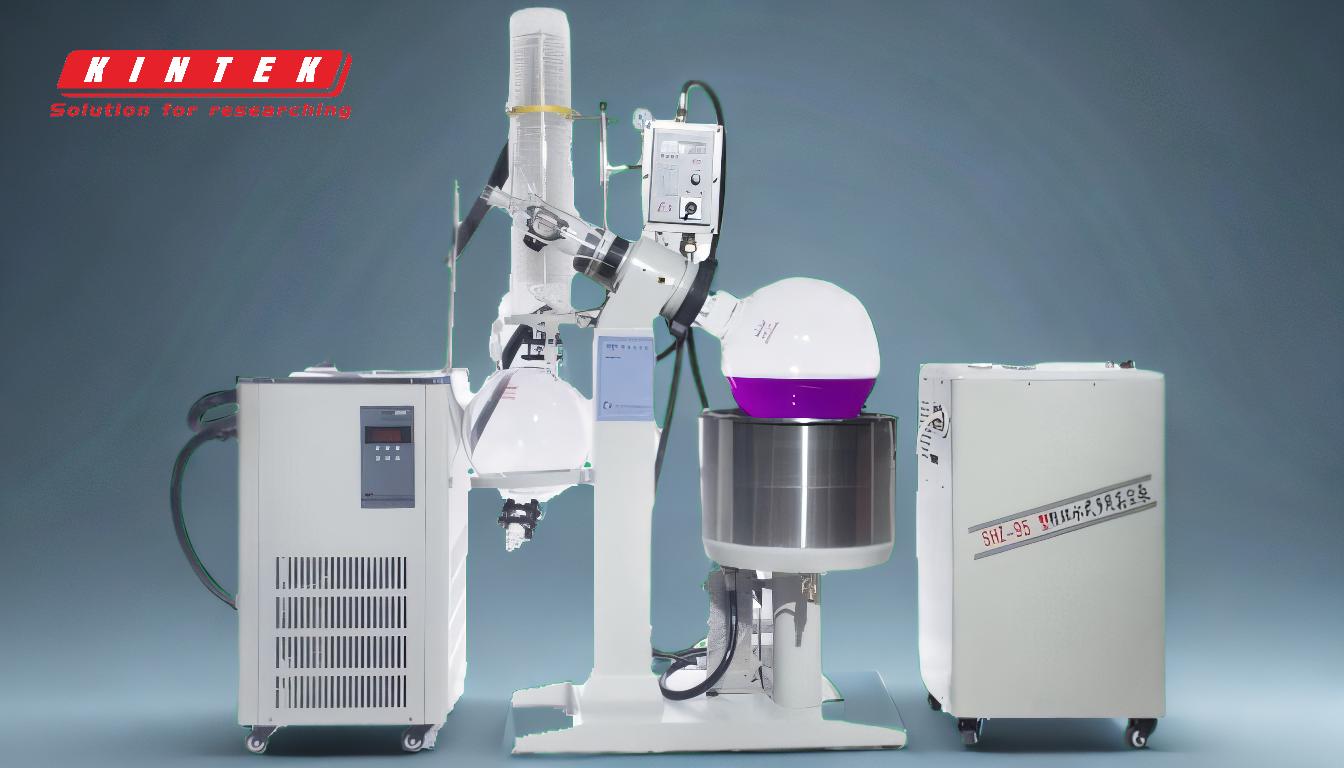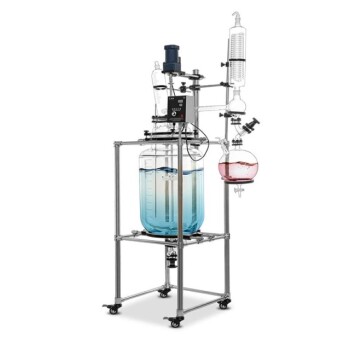A rotary evaporator, commonly referred to as a rotavap, is a laboratory device designed to efficiently remove solvents from samples through evaporation under reduced pressure. Its primary purpose is to separate low-boiling solvents from compounds that are solid at room temperature and pressure. This method is faster and more efficient than evaporation under atmospheric pressure, reducing the risk of thermal decomposition of the sample. Rotary evaporators are widely used in organic laboratories for tasks such as solvent removal from reaction mixtures, extraction of delicate aroma compounds, and preparation of samples for further analysis. They are particularly useful for solvents with relatively low boiling points, such as ethyl acetate or n-hexane, but can also handle higher-boiling solvents when paired with a capable vacuum system.
Key Points Explained:

-
Efficient Solvent Removal:
- The rotary evaporator is specifically designed to remove solvents from samples quickly and efficiently. By operating under reduced pressure, it lowers the boiling point of the solvent, allowing evaporation to occur at lower temperatures. This is particularly beneficial for heat-sensitive compounds that might decompose under higher temperatures.
-
Separation of Low-Boiling Solvents:
- Rotary evaporators are ideal for separating solvents with relatively low boiling points, such as ethyl acetate (EtOAc) and n-hexane. These solvents evaporate easily under reduced pressure, making the process faster and more controlled compared to traditional evaporation methods.
-
Reduced Thermal Decomposition:
- One of the key advantages of using a rotary evaporator is its ability to evaporate solvents without heating the sample to its boiling point at atmospheric pressure. This minimizes the risk of thermal decomposition, which is critical when working with delicate or heat-sensitive compounds.
-
Versatility in Solvent Handling:
- While rotary evaporators excel with low-boiling solvents, they can also handle higher-boiling solvents like water or dimethylformamide (DMF) when equipped with a vacuum system capable of achieving sufficiently low pressure. For solvents like water, pre-treatment with drying agents (e.g., magnesium sulfate) may be necessary.
-
Applications in Organic Laboratories:
- Rotary evaporators are a staple in organic laboratories due to their efficiency in solvent removal. They are commonly used to prepare samples for further analysis, isolate compounds from reaction mixtures, and extract delicate aroma compounds without exposing them to high heat.
-
Scalability:
- Rotary evaporators can accommodate a wide range of sample volumes, from small-scale experiments to larger volumes up to 3 liters. This scalability makes them suitable for various applications, from research and development to industrial-scale processes.
-
Gentle Extraction of Aroma Compounds:
- In addition to solvent removal, rotary evaporators are used for the gentle extraction of delicate aroma compounds. This is particularly useful in industries such as food, fragrance, and essential oil production, where preserving the integrity of volatile compounds is essential.
-
Comparison to Traditional Distillation:
- Rotary evaporators offer a distinct advantage over traditional distillation methods by operating at lower temperatures. This reduces the risk of degrading heat-sensitive compounds and allows for more precise control over the evaporation process.
-
Common Use Cases:
- Rotary evaporators are widely used in organic synthesis, pharmaceutical research, and analytical chemistry. They are also employed in industries such as food science, cosmetics, and environmental testing for tasks like solvent recovery, sample concentration, and compound isolation.
By combining reduced pressure, controlled heating, and rotational motion, rotary evaporators provide a reliable and efficient method for solvent removal, making them an indispensable tool in modern laboratories.
Summary Table:
| Key Feature | Description |
|---|---|
| Efficient Solvent Removal | Removes solvents quickly under reduced pressure, ideal for heat-sensitive compounds. |
| Low-Boiling Solvent Separation | Perfect for solvents like ethyl acetate and n-hexane, ensuring faster evaporation. |
| Reduced Thermal Decomposition | Minimizes heat exposure, preserving delicate compounds. |
| Versatility in Solvent Handling | Handles both low and high-boiling solvents with the right vacuum system. |
| Applications | Used in organic labs, pharmaceuticals, food science, and more for solvent recovery. |
| Scalability | Accommodates sample volumes from small-scale to industrial-scale processes. |
| Gentle Extraction | Extracts aroma compounds without damaging volatile components. |
| Comparison to Distillation | Operates at lower temperatures, reducing risks to heat-sensitive compounds. |
Learn how a rotary evaporator can optimize your lab processes—contact our experts today!














